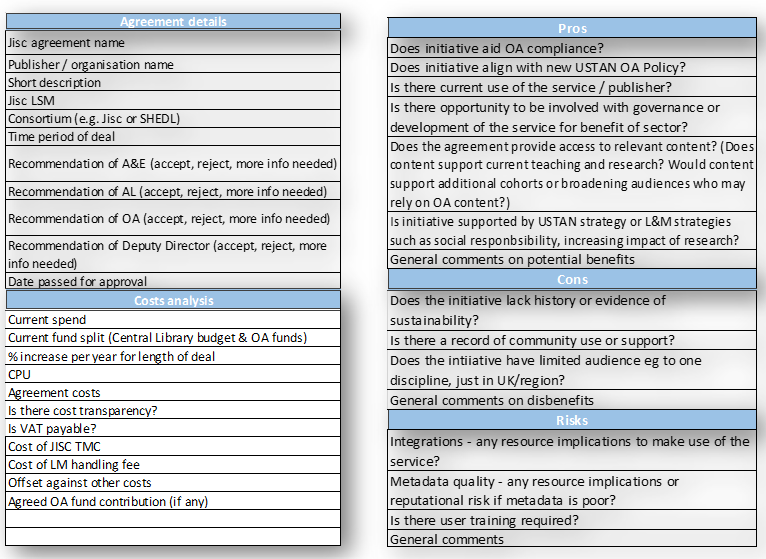This a guest post written by Jacqueline Proven, Head of Open Research at the University of St Andrews.
At the University of St Andrews (USTAN), we believe that “Open Access (OA) must be globally sustainable and equitable and make the best use of resources…” [see our open access publications policy statement for more detail].

Conditions: CC BY-NC Creative Commons Attribution-NonCommercial 4.0 International Public License
In order to make this a reality, we are continually developing our approach for evaluating a range of initiatives which can support sustainable OA, including ‘collective models’ such as library memberships and institutional subsidies (see the OAPEN OA Books toolkit for more examples). This blog post describes our current decision-making process and the criteria we use when choosing which initiatives to support financially.
Background
Since 2014, we have managed a small institutional OA fund which was set up with the intention “to promote and encourage new and innovative open access models” (see our report describing the case for this fund). To further this aim, the fund cannot be used to pay Article Processing Charges (APCs) in hybrid journals (subscription journals which have not demonstrated a plan for moving to a fully OA model).
Our new open access publications policy was launched in in February 2023, and includes provision for books and chapters, as well as explicitly referencing diamond OA (where there are no fees to either read or publish).

Decision-making
Inspired by a presentation by the University of Salford at UKSG in 2021, we also began using an evaluation template for journal agreements (read more about how the University of Salford assess and manage their read and publish deals).
Evaluation is undertaken by a cross-Library group with representatives from Academic Liaison (collection development/subject knowledge); Acquisitions & E-resources (usage/costs); Open Research (publishing history/funder compliance/OA policies); and the Deputy Director (budget approvals/Library strategy). The group forms part of our governance structure, feeding into the Collections Working Group as necessary.
We have further developed this approach to consider elements of a range of initiatives, including new publishing models such as Subscribe2Open, open infrastructures, collective action and community frameworks which support OA. This new template has been designed to challenge our thinking and provide a clear analysis of how each model meets our underlying strategy. The detailed questions we ask ourselves make sure we can identify and understand the benefits, risks and costs involved.

Conditions: CC BY-NC Creative Commons Attribution-NonCommercial 4.0 International Public License
The criteria have also been applied to several models focussed on OA monographs, with sign-ups including:
- Central European University Press Opening the Future – an innovative model, with clear evidence of publishing related to USTAN
- MIT Press Direct to Open membership – broad range of relevant content, some publishing history
- University of London Press: New Historical Perspectives (via Jisc Open Access Community Framework) – mission-driven press with USTAN link to the society
- White Rose University Press Diamond OA Monographs (via Jisc Open Access Community Framework) – library-led initiative with relevant content
You can sign up to all these agreements via Jisc’s License subscriptions manager.
Future strategy
The current approach does depend on luck to some extent, in terms of timing of deals coming through and whether for example, we have year-end funds available to purchase. However, there is always a robust evaluation behind each decision and assurances that our financial and licensing decisions follow the University’s scheme of delegation. With the help of our Open Research Working Group and the Collections Working Group, we plan to develop a more proactive approach to decision-making and to consider our budgets more holistically to evaluate spend as part of expanding provision for open research. As a step towards this, we plan to document a set of principles to underpin the decision-making.

Conditions: CC BY-NC Creative Commons Attribution-NonCommercial 4.0 International Public License
Draft principles may include:
- Cost analysis: does it offset acquisition costs, is there cost transparency, does it include VAT, CPU (if content included)
- Policy alignment: meets USTAN Strategy, OA Policy, funder compliance requirements
- Disciplinary alignment: appropriate subject coverage for USTAN supporting current areas of teaching and research, publishing opportunities for staff
- Mission: long-term aims, non-profit, approach to collaboration, academic-driven/led, engagement with societies, global equity and sustainability
- Governance model: ability to influence through Library sector, community approach, partnerships
- Technical: built on open infrastructure, easily integrated into other systems, follows metadata, accessibility and interoperability standards
- Quality of content: meets or extends good practice in publishing
Further information
We are happy for other institutions to adapt and share our template and principles, and we welcome feedback on different approaches and evaluation criteria for supporting sustainable OA book publishing. Please get in touch by emailing open-research@st-andrews.ac.uk
